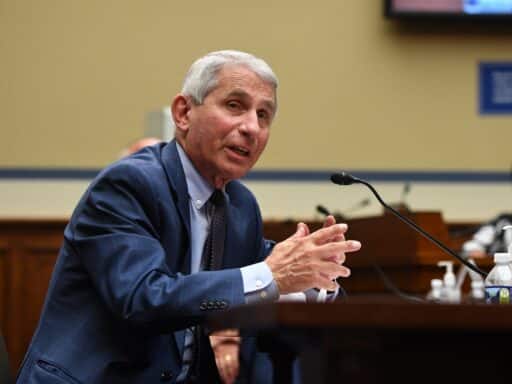With vaccine acceptance rebounding among Americans, Fauci’s goal does not appear so unrealistic.
As the Covid-19 vaccination campaign gets underway, Dr. Anthony Fauci, the nation’s leading infectious disease scientist, told Vox’s Sean Rameswaram on Tuesday that he is hoping to get as much as 85 percent of Americans vaccinated against the virus.
“If you really want true herd immunity, where you get a blanket of protection over the country … you want about 75 to 85 percent of the country to get vaccinated,” Fauci, the longtime head of the National Institute of Allergy and Infectious Diseases, said in a live-recorded interview with Rameswaram, the host of Today, Explained. “I would say even closer to 85 percent.”
How many people need to get vaccinated to end the pandemic that has already killed more than 300,000 Americans and disrupted every facet of daily life has been the subject of some debate for months, as Vox’s Umair Irfan has covered. The conventional wisdom has been that, at minimum, 60 percent of people would need to be vaccinated in order to start bringing case numbers down to a manageable level.
Fauci is aiming even higher. “We’ve got to get as many people as we possibly can,” he said in the Vox interview.
Earlier this year, such a high threshold would have seemed outlandish. In September, the Pew Research Center found that barely half of Americans (51 percent) said they would definitely or probably get the Covid-19 vaccine. That was down from 72 percent in the spring, as fears over a rushed and politically influenced approval process spread.
But now, with Pfizer’s vaccine already in use and another from Moderna likely to gain approval from the Food and Drug Administration very soon, public attitudes are starting to improve, and Fauci’s goal does not appear so unrealistic. Pew detected a rebound in vaccine acceptance at the beginning of December; a new Ipsos poll this week found that 84 percent of Americans said they’d be willing to get a Covid-19 vaccine eventually (although 44 percent said they plan to “wait a bit” rather than getting it as soon as it is available to them).
One thing that should help the Covid-19 vaccines stamp out spread, besides as many people getting their shots as possible, is that the Pfizer and Moderna vaccines appear to be extremely effective. Both use a new technology called messenger RNA (explained here by Vox), and both have been found to be more than 90 percent effective in preventing people from developing Covid-19 symptoms.
That’s “almost as good as it gets,” Fauci told Vox. He pointed out that the measles vaccine, with 98 percent effectiveness, is the best in the world and the new Covid-19 vaccines have nearly matched it.
“We’re not too far away,” he said, “right in that ballpark of a really extraordinary vaccine.”
There are still unknowns about the Covid-19 vaccines. How long will they provide protection? Will patients be diligent about getting both doses of the Pfizer and Moderna vaccines, so they get full protection? Do the vaccines simply stop people from having symptoms, or do they actually prevent people from transmitting the virus? Not to mention the questions about producing enough doses and what will be done once other vaccines win federal approval.
But these are good problems to have. A Covid-19 vaccine has been developed in record time, people seem receptive to getting vaccinated, and there are two highly effective vaccines so far.
Fauci said that even once 40 to 50 percent of Americans have gotten vaccinated, the US should “start seeing an effect on the dynamic of the virus.” That is welcome news with the country reporting more than 200,000 new cases and nearly 2,500 new deaths every day.
Vox’s live conversation with Fauci will be part of the Today, Explained upcoming podcast series “You, Me, and Covid-19,” looking back on how the coronavirus has fundamentally reshaped our world. Through reporting, listener reflections, and interviews, the team will examine how Covid-19 has changed our relationships with one another and the places we live, upended our livelihoods, and redefined what we thought of as “normal.”
The first episode of the series drops on Monday, December 21, and continues through that week. Subscribe to Today, Explained wherever you listen to podcasts — including Apple Podcasts, Google Podcasts, and Spotify — so you don’t miss an episode.
Author: Dylan Scott
Read More



